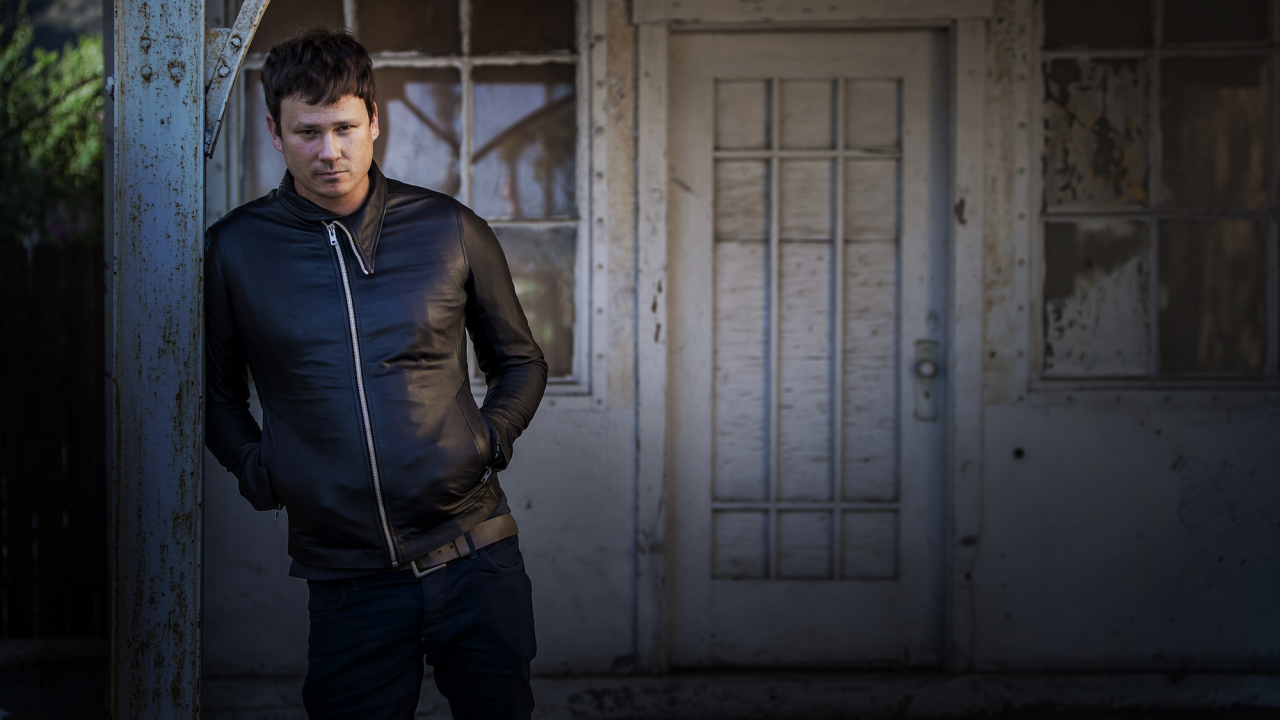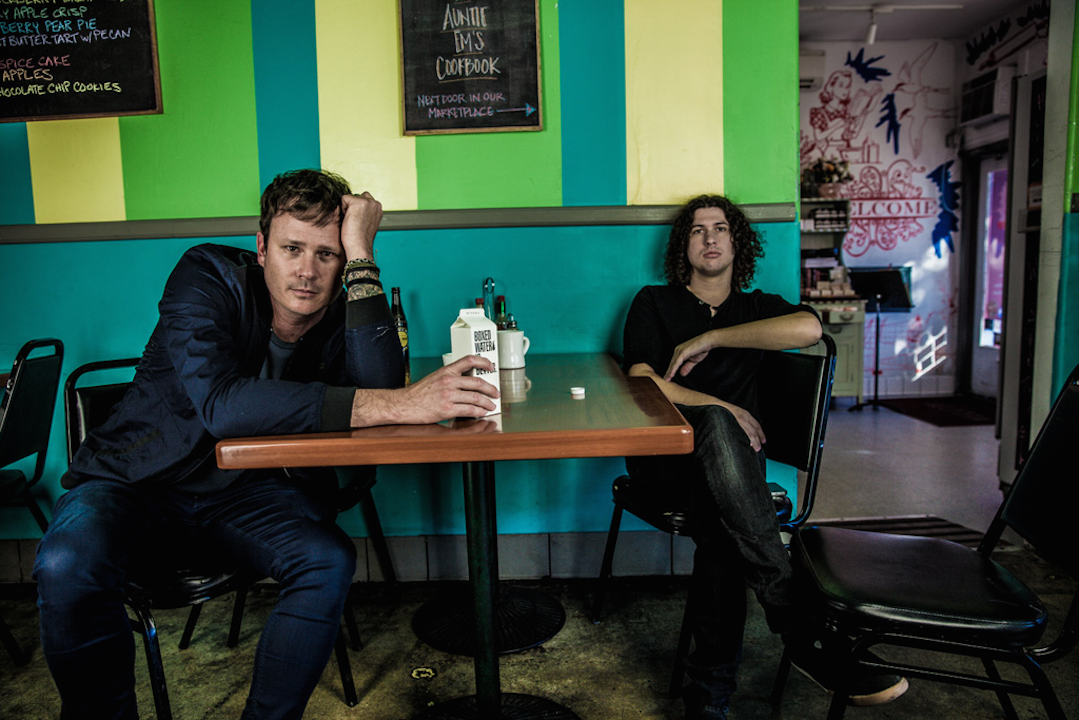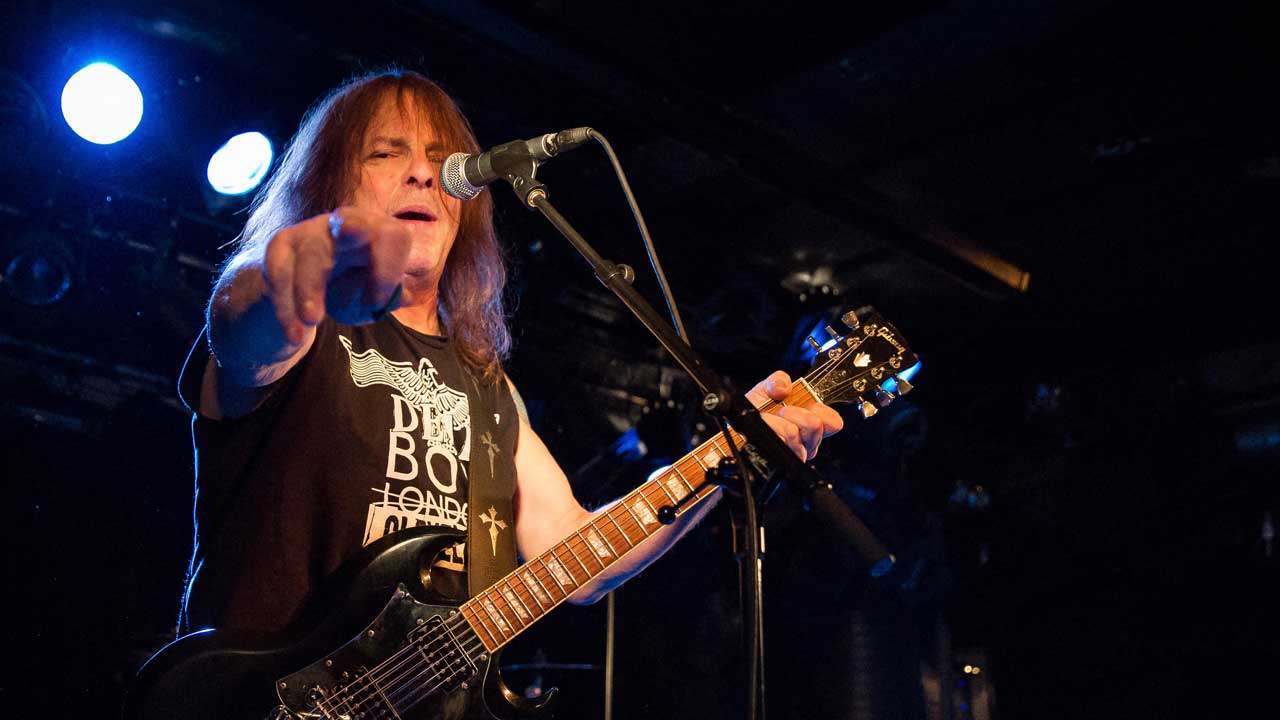The visions of Tom Delonge
Angels & Airwaves' frontman talks to TeamRock about the concept behind his animated film and new album

Select the newsletters you’d like to receive. Then, add your email to sign up.
You are now subscribed
Your newsletter sign-up was successful
Want to add more newsletters?

Every Friday
Louder
Louder’s weekly newsletter is jam-packed with the team’s personal highlights from the last seven days, including features, breaking news, reviews and tons of juicy exclusives from the world of alternative music.

Every Friday
Classic Rock
The Classic Rock newsletter is an essential read for the discerning rock fan. Every week we bring you the news, reviews and the very best features and interviews from our extensive archive. Written by rock fans for rock fans.

Every Friday
Metal Hammer
For the last four decades Metal Hammer has been the world’s greatest metal magazine. Created by metalheads for metalheads, ‘Hammer takes you behind the scenes, closer to the action, and nearer to the bands that you love the most.

Every Friday
Prog
The Prog newsletter brings you the very best of Prog Magazine and our website, every Friday. We'll deliver you the very latest news from the Prog universe, informative features and archive material from Prog’s impressive vault.
Tom Delonge is a man of many grand ideas. He’s back steering the Angels & Airwaves ship after a run of massive shows with Blink-182. In recent years, he’s also found time to create graphic novels, helm films and owns a successful clothing line. The list goes on. It seems there aren’t enough hours in the day to realise them all, but he somehow manages it.
One such idea revolved around an animated short which centres around an alternate universe created by a collective of unconscious thoughts. It’s central character, Poet Anderson, meets a guardian angel who helps him confront his demons. Written by Delonge and realised by director brothers Edgar and Sergio Martins, a 15-minute short – Poet Anderson: The Dream Walker – recently scooped the award for Best Animated Film at this year’s Toronto International Film Festival. Yeah, the guy who wrote a questionable Blink-182 song about dogs is the brains behind an award-winning film. Yet Delonge’s ascent from the ridiculously puerile to filmmaker isn’t that surprising. In recent years, both with Blink-182, his brief 2002 side-project Box Car Racer and his long-running space-themed project Angels & Airwaves, DeLonge has veered more towards the serious side of things, offering up a more mature, considered and intelligent side of himself for public consumption. The Poet Anderson film is the latest part of Angels & Airwaves project, and is only a fraction of a cross-media concept that will involve their new album (The Dream Walker), comics, a novel, a graphic novel and much more more. It’s all an epic, ambitious undertaking, but as he tells TeamRock, he wouldn’t have it any other way…
Firstly, congratulations on winning the award for the film. How do you feel about getting that kind of validation?
“Thank you so much. We’re so stoked. Two years of work went into that thing and it feels great. The whole purpose of this trans-media project that Angels has been involved with for ten years now was to create something that’s relevant and competitive and that the critics would validate. But you never know. It’s happening in a territory the band have never been in. This has never really been done in the history of entertainment, where we’re merging all these different industries into one project, and it’s hard.”
Was this trans-media approach always the plan for Angels & Airwaves?
“That was always exactly what we said. I always said that this wasn’t a band, it was an art project that we were going to communicate themes of human behaviour through different mediums. This property in particular of Poet Anderson, it’s not the band who own it. The band are supporting it and the animations are supporting it – everyone’s working for the common theme called Poet Anderson. We cut our teeth on our first feature film, Love, and that was not easy. That was a five year project of digging holes and creating a civil war battle in our director’s back yard. It’s a lot of work.”
Why did you decide to experiment with all these different outlets? Is it a reaction to the declining music industry, or purely because you want to invest in the art of what you’re doing?
The latest news, features and interviews direct to your inbox, from the global home of alternative music.
“It’s a few different things. I don’t want to do what everyone else is doing. That’s number one. And everyone is making a record. I want to surround myself with artists who are better than myself so I can learn from them and be inspired and challenged. Another thing is that I think the future of the arts is going to be this way. The same device that you can use to record a record – you know, a laptop in your living room – you can also use to write a novel, make an animation, make a movie, create a comic book. You can do all these things and it’s all there and I think that’s what’s going to happen, because music has become fodder. It’s digital and it’s disposable, and I think the future of music and art in general will be a blend of an experience that you can perform, that someone can read, that someone can watch, that someone can listen to and someone can collect. And that’s what we’re doing – we’re making collectible, limited edition merchandising, we’re creating digital media and we’re also creating a path to have an experience where all this stuff comes to life. So there’s a bunch of reasons holding up the tent as to why we’re doing this.”

Delonge with Angels & Airwaves’ Ilan Rubin (right).
You co-wrote this album with new drummer/keyboardist Ilan Rubin. Was the approach to The Dream Walker different from previous Angels & Airwaves albums?
“Oh yeah. I mean, I wrote all those other records by myself, all stressed out trying to do so many different things at once. And now I have a co-writing partner. Ilan came into the band and we had a lot of fun writing this record together and pairing two completely different styles together and trying to come up with something that was pleasing to both of our ears. And I think we landed on something that’s really cool. We spent so many years branding what Angels & Airwaves is that we wanted to take a pretty strong left turn and do something different and show people that we cannot be predictable.”
Were you worried about taking that jump?
“I was worried in the beginning because we didn’t know how to write together. When we first started, it was all over the place and I was really freaking out. It was about a year into it when we figured out how we create what we like. So what you’re hearing is a really difficult and lengthy negotiation between two people that see very differently. And we actually get along great. It’s not like bands fighting in the studio and punching each other. We had our moments, but it actually was a really great process, because Ilan is very cerebral. He’s the kind of guy who’ll stay up all night long to read a manual and come out the next day knowing how to build a synthesiser. He can play every instrument. He’s the best piano player I’ve ever seen in my life. He plays drums for Nine Inch Nails but he’s definitely better on guitar than I am. It’s funny. We used to say Ilan will paint the most intricate painting and I’m the kind of guy who will just dump a load of paint on a canvas. It really was a different process.”
**What was the seed for the record – the narrative or the music? **
“I’m a theme guy and I work from there backwards. I rarely start with something and see where it goes, except when I’m recording music itself. But the entire project I start where I want to end up and I work backwards. The character I thought up of 15 or more years ago in a Paris hotel at about two in the morning. It came to me that there needed to be a new Peter Pan that was really cool and not dancing around in tights, but it took me a long time to understand what he stood for and what he represented. I was exposed to some studies from Stanford [University] on dreams and nightmares preparing people for real world events and influencing your decision making and you don’t even know it. And the idea that space is potentially infinite means there’s infinite possibility. Who’s to say that the half of your life that you spend dreaming isn’t actually travelling to somewhere else and experiencing these things? And then you wake up and all of a sudden you make a decision, like breaking up with a girl or voting on a bill in Congress or whatever the fuck you do, and it’s because you had some nightmare the night before and you don’t even realise it. That to me was really interesting, because anything’s possible and I wanted to explore that. So Poet became a thematic enterprise about lucid dreaming and it gave us the ability to go really, really far with it.”
**There’s a real numbness to this record, which is different to the emotion of, say, Box Car Racer and later Blink. **
“It’s funny. I wanted to be more ambiguous about what I was feeling. I wanted people to be able to define the second half. Bob Dylan used to never talk about what his songs meant. He didn’t want to define it for the listener, and I thought that was pretty rad. With Angels I was always putting it out there, and with this one I didn’t, and I think it’s catching a lot of people by surprise that listen to Angels & Airwaves, where something that was so full of hope and so passionate is all of a sudden more ambiguous and a bit darker. I knew from the peripheral look in that Angels needed to come out of the clouds and become more angsty and become more raw and more organic, and these are just broad strokes from a paintbrush but I think we achieved it. I think it feels sad at times and it feels isolated at times and I think it does feel numb at times because all of a sudden all these things I used to say about never giving up and putting yourself out there and all these aspirational adjective are not exactly present on this record. And I think it’s polarizing for fans who are not sure what to think about it, like ‘What happened?!’ It’s good to keep people guessing.”
Isolation is a recurring theme in the world of Angels & Airwaves, too. What is it that’s so compelling about it for you?
“I don’t know. I feel like everyone feels isolated. You have all these people you love, you have your family, you have your friends that you may or may not have had for many years, and if you take the one person that you think understands you the most and gets you, they still don’t see the world and experience what you experience in your way. You’re still alone. I think that’s why everyone has their own set of fears and desires and things that turn them on. I think that everyone feels alone, even though you might have a wife or a husband or a best friend…I think everyone still feels alone and feels scared of dying or wonders what this is all about or wants a life change. I think that’s the weird dichotomy of human existence, is that love matters more than anything, but even when you have it you still feel alone. If that makes sense…”
**Absolutely. For me, I’ve been thinking a lot about the idea that the past could’ve been a dream. It’s a very scary thought. **
“It’s funny you say that. This morning I was thinking back about being in a van and travelling to clubs for 20 years and I was like, ‘Did that really happen?’ Because I was thinking about doing all these animations and movies and stuff and it was like, ‘What am I doing?! What am I involved in?!’”
And it gives you a sense of displacement, but it’s also inspiring because it encourages to find the answers - not that you can - to what you’re thinking and wondering and worrying about.
“Something I’ve always done, and I think there’s harmony in it, is to realise you’re not defined by what you’ve done, you’re not defined by what you’re going to do, you’re defined by what you’re doing at this moment and you accept that what you’re doing is going to change and evolve. But don’t focus on the past, because it’s gone. It can’t be replicated. Don’t focus on the future because you have no fucking clue what it’s going to be. Right now, what are doing to have an experience that’s worth it? I think that’s an important thing, and Angels & Airwaves is built on these sets of ethos, of changing the way you see yourself and the way you see the world around you, building a better world one person at a time. It’s a very new age concept and a very spiritual concept, but that’s who I really am at this point in my life. I still run around doing the dick jokes and saying really off-colour things, but I love being an adult and being able to use my mind and saying my mind as important as the next guy’s and putting things out there for people to chew on.”
Do you think people judge you from the Blink days a bit too much still?
“I think it’s changing. I wasn’t there, but when we premiered our animation at the Toronto Film Festival and won the big award, they had this question and answer thing and I guess when the judge said who did the animation, that it was the guy from Blink, there was a group within the audience that had a pretty intriguing gasp. Like, ‘Oh. I didn’t expect that!’. And that’s fine. I spent quite a long period branding myself as part of something that is a very specific thing, and it’s gotten me everywhere in life. Everything that I do is from being a part of that, and I’m so appreciative and so lucky, but people can’t define anybody that easily.”
**And just where do you see Angels going now? **
“This is just the beginning. I’ve always said that the first ten years were the prologue. The first ten years was educating people that we had dreams – pun intended – that we had aspirations to do different things. People don’t even know that I never wanted to be on a label. They don’t understand it. They take advantage of artists and they’re obstacles to bands connecting with their fans. So I was like, ‘How do I create an infrastructure for Angels to be able to do multimedia, transmedia exercise, but also have it manageable and have it be conducive and sustainable so we can grow with it and whatever. And so we dreamed up a software platform called Modlife, and that software platform powers Pearl Jam’s fan club and the releases of Nine Inch Nails and Kanye West. We do a lot of shit and that came from Angels & Airwaves, and people don’t even know that. People don’t even know what this band has done for the music industry. We’re the first ones to come out with movie trailers and short films and all this different stuff. Some of this stuff has existed in different forms with different bands – Pink Floyd did a rock opera and other bands have done thing like that – but doing an actual live action film that wasn’t a vanity project on Love, that’s never been done before. Giving out a completely free album – the amount of downloads we did on Love, the first one, was insane, it was like the most of all time. We’ve done some really, really interesting things. When we put out this novel, we’ll be the first band to have a New York Times bestselling author put out a novel associated with what we’re doing. I’m throwing it out there not because I’m bragging, because I have nothing really to brag about – it hasn’t succeeded yet – but I’m putting it out there because I think it’s worth noting. It’s worth noting the ambition and it’s worth noting the effort that everyone’s putting in to try to create something that’s new and different and has a really good heart and soul to it and that’s trying to make a difference, and not only with the music industry but with people’s lives as well.”
Angels & Airwaves’ new album The Dream Walker and the short film Poet Anderson: The Dream Walker will be available from December 9.
